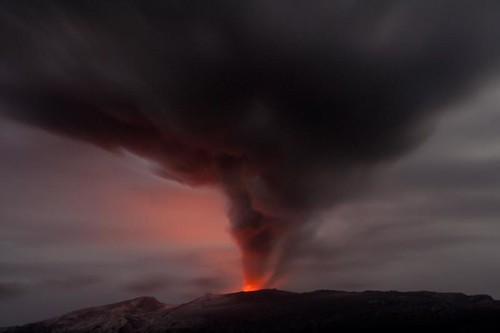
Night image of Eyjafjallajökull erupting on April 24, 2010. Image courtesy of James Ashworth.
A quick update on the Eyjafjallajökull eruption: Not a lot to report in terms of changes in the volcanic activity at the volcano. The update from the Icelandic Met Office last night sums it up nicely:
This update is one of the first to mention lava flowing in the crater, almost half a kilometer at this point. The ash from the volcano is causing little disruption of air traffic today, with even the airports on Iceland reopening after closing over the weekend. Iceland continues torecover from the eruption as well. This is also a report of thermal imaging from space that suggests that the heat being emitted from the volcano is rising, which might make sense if more of the basaltic magma is filling the edifice and erupting in the strombolian explosions and lava flows.
Now, the political storm caused by the flight cancellations continues to rage as well. I still stand by my ascertion that EU officials made the right decision with the information on hand. Most of the articles criticizing the closure refer to information we know now but was unknown to the people making decisions during the eruption - so, remember, hindsight is always 20/20. The question I ask anyone who thinks the closure was wrong: based on the information on hand at the time (ash from a volcanic eruption was likely over Europe, potentially in significant amounts and we have little information of how much ash an airliner can ingest safely), would you have let your mother take a flight? I think, pretty clearly, the answer should be "no". What this all shows is thatEU officials needed a better plan to deal with these exceedingly rare events for most of northern Europe and airlines needed to have ready access to information about how their planes would respond. The way the media and business has responded, by trying to scapegoat the government in being "overly cautious" (as they should be) will make the next ash disruption a lot harder to implement and we can only hope that it doesn't lead to a real disaster.












